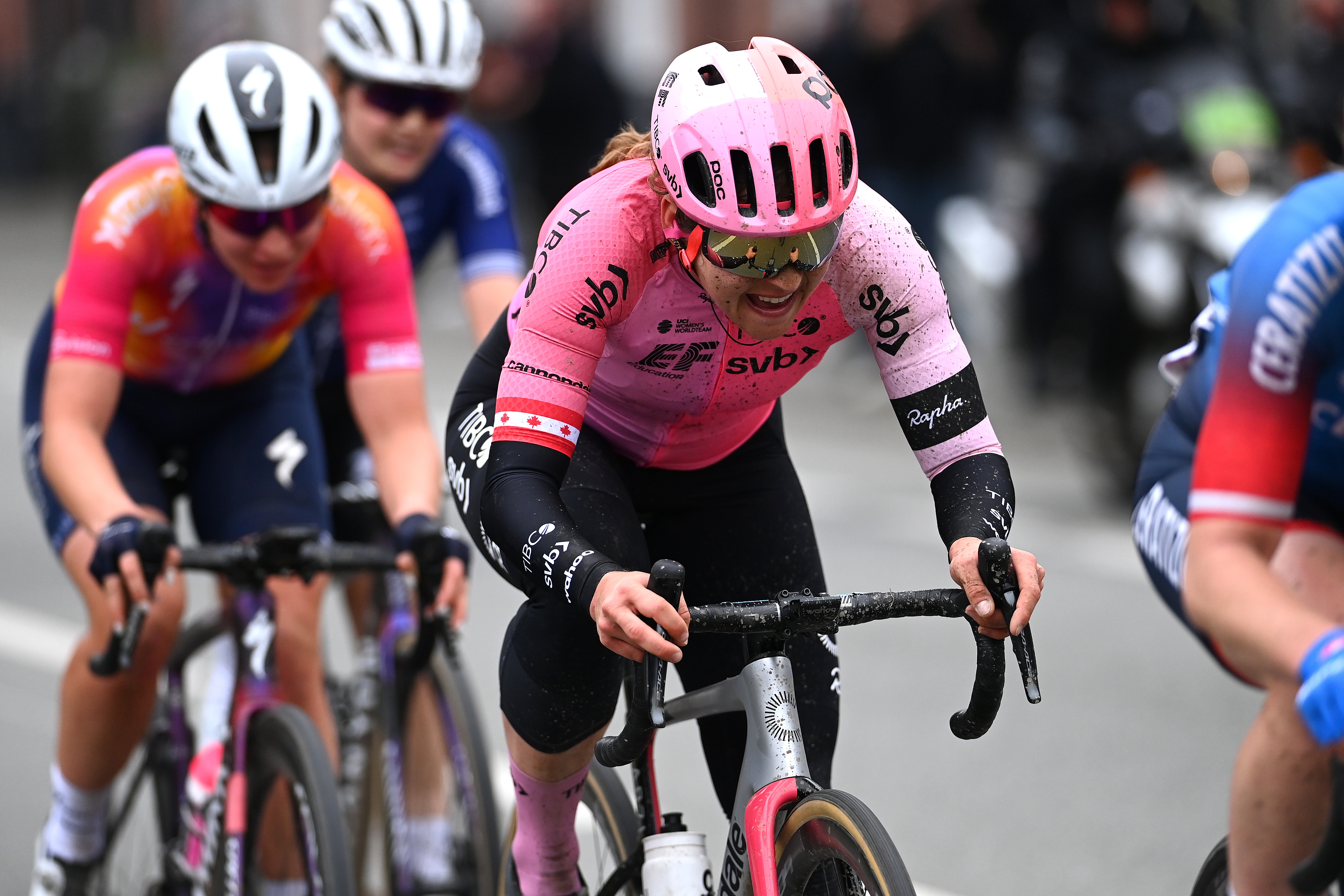
This exclusive interview originally appeared in Cycling Weekly magazine on 14 December. Subscribe now and never miss an issue in 2024.
Alison Jackson has lost count of the number of interviews she has done about Paris-Roubaix. “I remember that week, I had one day of media that was eight hours,” she tells Cycling Weekly on a pub bench in East London. “People came to the Airbnb, we did a ride, and they followed me around. It was like interview after interview and sometimes I would feel like I was quoting myself.”
The attention was no surprise, really. Given the scale of what she achieved, people will ask Jackson about the race for the rest of her life. She smiles at the thought. “I’m going to try live off it and get a few free dinners or coffees out of it,” the EF-Education-TIBCO-SVB rider laughs. “I have this idea of me being like an 80-year-old woman, and still trying to wear my tracksuit from this year, and it’ll have a mustard stain, and I’ll be like…” - she wags her finger and puts on a frail voice - “‘Well, when I was your age… Don’t you know Paris-Roubaix?”
When Jackson won in Roubaix this April, the moment was both career-defining and historic. She captained the day’s breakaway move, drove it to the beat-up outdoor velodrome, and rolled her rivals in the sprint, becoming the first Canadian to taste victory in one of cycling’s Monuments.
The closest to the feat before her was Steve Bauer, who finished second in 1990. For over a century, Paris-Roubaix had been reserved only for men. “When I became a professional, teams and female cyclists were really pushing that there should be a female version,” Jackson says. “It seemed that it would be the right amount of chaos of a bike race that I would enjoy.”

Jackson’s results in the first two editions proved her assumptions; 24th in 2021 and 13th in 2022, she understood the race, and had the tactical nous to keep herself near the front across the cobbles. “I think you have to be your own best cheerleader,” she says. “When you look back at the men’s race at Paris-Roubaix, a lot of times the break goes really far.” So when it went this April, shortly after the flagdrop, Jackson made sure she was in it.
“I think that every person in the break would be getting messages from their radio saying, ‘Make sure you do a little less than the others’, but that’s pretty negative,” she says, recalling the day. “If we start doing less and less, then we’re just not riding, and we’re going to get caught. From the very beginning, I chose that I was going to take my turn every time and I was going to show by example that I believed in it.
“I think everyone saw that like, ‘Well, Alison believes this can happen’, and I think it kept everyone a little bit more motivated. Also, I had to remind some girls that getting a top-10 result at Paris-Roubaix is still a huge thing.”
The run-in to Roubaix had been far from smooth for the Canadian. A crash at the Ronde van Drenthe a month prior left her with a hole in her knee so deep it needed four stitches to fix. “By that time, the stitches were out, but the wound was still so fresh that I wore patches on it, and knee warmers just in case,” she says.
Her celebrations in the velodrome showed no signs or recent surgery. She dropped her bike on the floor, and, spinning in a circle, broke into an unrehearsed dance routine. “That’s just how I genuinely express myself and my excitement - with jazz hands,” she smiles.

Over the years, the 35-year-old had become a celebrity in the peloton, not so much for her race results - which count multiple national titles - but rather for her dancing videos, which she began posting to social media in 2019. The week before she won Roubaix, a Canadian publication ran an April Fools’ joke saying that she was quitting cycling to become a full-time influencer.
“That article has haunted me since,” she laughs. “People took it seriously. At one time, there was a whole podcast about it, like, ‘We will miss Alison Jackson in the peloton, but won’t all the new content be great?’
“For me, it was just something that was really fun, and I would be killing myself laughing at all the things that I was doing, and then just wanting to share that with other people, share my joy.”
Still, despite the love she received back, “I never wanted to be known as the TikTok cyclist,” she says. “I want to be known as a great athlete, and I have always felt that I could back that up with results.”
Now, Jackson explains, people do not ask her about dancing when they pass her in the street, “they tell me where they were when they watched the race. I mean, it’s my experience, it’s my life, I won the race, and it’s my achievement, but it’s bigger than me. It meant a lot to a lot of different people who watched it and were inspired by it.”
In the moments after she crossed the finish line, Jackson sat at a table in her winner’s press conference, and patted her 15kg cobblestone trophy. She told of her childhood on a farm in Vermilion, a rural town at the intersection of two highways, where she would scavenge for rocks out in the fields. Her Roubaix cobble is now the most treasured of her collection. “Sometimes I use it for gym training,” she says.
Next April, Jackson will return to northern France with the number one dossard on her back. She will have more media duties than she has ever had before a race, but still, she says, there’s “no pressure”. What are the chances the other riders let her into the breakaway? “If that happens again, that would be wild,” she laughs.







